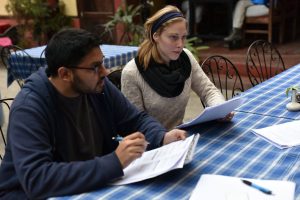J-Term Practica, 2016
April 6, 2016

This past January was an amazing experience for me. I have always been interested in the business and trade world. I hadn’t given much thought to the development sector. This J-term trip really changed my perspectives on what it means to be successful. Our Nepal trip started off great, right from the beginning. The interpreters we worked with were very knowledgeable, though a bit youthful, they brought enthusiasm and excitement to the group every day we went out into the field. I was originally born in Bangladesh, so the aesthetics of Nepal didn’t shock me but more than anything being their humbled me and made me realize how fortunate I was.
The first few days of our trip we practiced our surveys with each other numerous times and local individuals in the area. Once we were confident in our goal of the project, we were introduced to our local partners in the Kathmandu, Local Interventions Group (LIG) and Accountability Lab (AL). Both organizations had a great reputation in the information dissemination sector. Initially, I had difficulty understanding their role in our project. But after speaking with Pranav, a director of LIG, I realized they were there to support us in the field.
Once we actually started going to the villages and surveying these individuals, I was very nervous at first. Everyone seemed so hospitable, even though they didn’t have much to offer us, whatever they were able to scrounge up was enough. I heard so many stories of heroics, of sadness, and of hope; it’s difficult to start in just one place. But a moment that really resonated with me was during a break we had in the Kavre District while giving surveys, to be more specific it was in Ward 09- Charghare. The team and I were taking our lunch break at the corner of the ravine, there was some trash laying around, which is typical in rural villages, but the air was fresh, the atmosphere was lively and my stomach was growling so I wasn’t too distracted by the smell. About twenty minutes into our lunch an elder gentleman passed by, uttering phrases in Nepal, waving his hands, and looking very animated. At first, I didn’t understand what was happening.
Then our interpreter explained that this individual was thanking us. According to our interpreter, he had said, “Thank you Americans for coming. Your help is much needed. You don’t have to help me but please help them (the villagers). They need your help.” Upon hearing this, I was at a loss for words. This person, who had ratty clothes, a broken walking stick, didn’t want any help for himself, but simply his village. Moments such as that reminded me of the goodness that still exists in people and even when tragedy strikes and disasters happen, there are people who always want the best for the people around them. I will cherish that memory and carry it with me for years to come.




You must be logged in to post a comment.